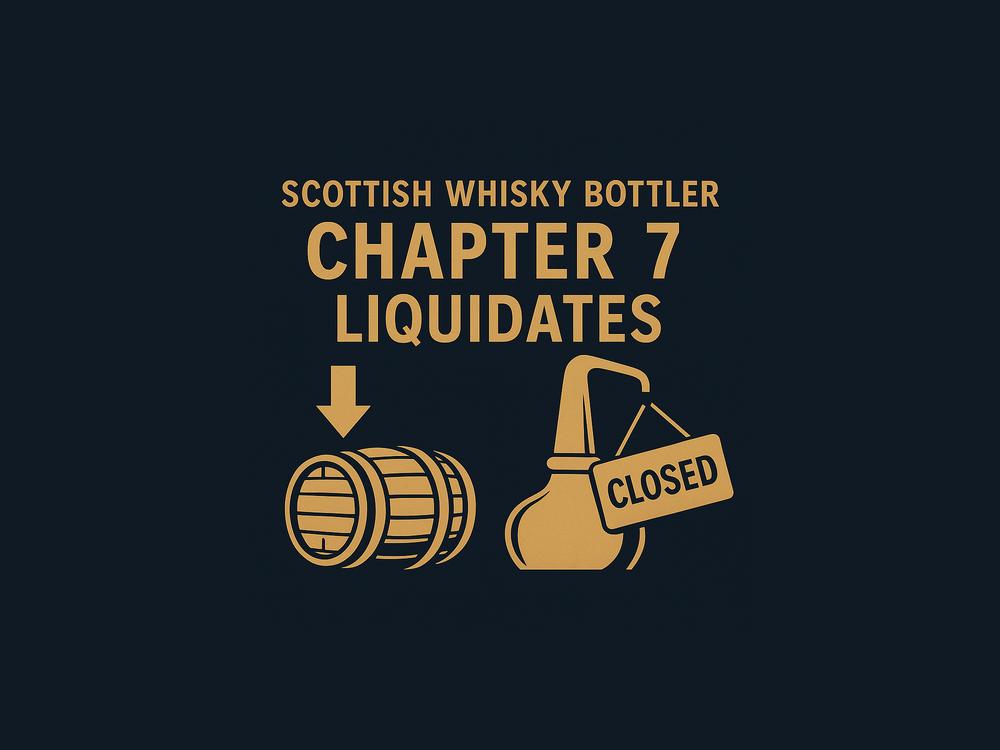Ardent Spirits Aquires Liquidated Chapter 7 Indie Bottler

Published November 6, 2025 by John Fegan
Update
Brand Rescued by Ardent Spirits
The sector specialist, as it turns out, was not a mysterious consortium of intergalactic accountants but simply Ardent Spirits, a company that already owns Dark Matter Distillers and therefore has at least some experience in handling liquids that encourage philosophical reflection. Begbies Traynor confirmed the acquisition with the solemn relief of people who have finally finished a long and deeply disappointing spreadsheet.
Chapter 7 was once a respected name in the slightly obsessive world of independent whisky bottling - the sort of world where people discuss casks the way poets discuss sunsets, only with more spreadsheets. Founded in Perth in 2014, it specialised in buying barrels from all sorts of distilleries and releasing them under its own label, usually in quantities small enough to make collectors twitch with anticipation.
When the world slowed and locked its doors, Chapter 7 kept going. People found comfort in amber light and online orders. Hope came in cardboard boxes with wax seals and tasting notes. So when 2022 arrived with promise and possibility, the company grew, opening a bottling hall in Glasgow. It was a leap of faith, and faith, at the time, seemed justified. Nobody expected the demand curve to turn around quite so fast.
It did.
Then, with impeccable comedic timing, the market changed its mind. Sales slumped. Retailers were overstocked. Importers hesitated. Consumers, it turned out, already had more whisky than they had emotional capacity. And Chapter 7 found itself with swelling overheads, dwindling orders, and spreadsheets that had stopped offering comfort and begun offering commentary.
What Actually Happened
With no new investment and no sensible way to shrink without disappearing entirely, Chapter 7 finally did what so many companies do when optimism runs out and entered liquidation in October. Two employees were affected, which in business-speak means two actual people with names and bills. The liquidators have since confirmed that the brand name and intellectual property have been bought by a “sector specialist,” which is the polite way of saying someone who believes they can resurrect it under better stars and fewer overheads.
The Bigger Picture
They’re not the only ones feeling the chill. Scotland’s whisky scene, once booming like a distillery on overtime, has started to run out of steam. The Famous Grouse got itself a new owner last year. Edrington, the outfit behind The Macallan (a liquid investment portfolio with caramel colouring) and Highland Park, saw revenue down 12 percent and profits sink by over £100 million. Even BrewDog, who’ve built an empire on swagger and slogans, managed to lose £34 million.
Everyone now speaks of “cooling demand,” “stock realignment,” and “temporary headwinds,” which are three delightfully evasive ways of saying the same thing: people are buying less whisky than they were two years ago. And for an industry that prides itself on patience, the waiting suddenly feels a little too real.
The Official Statement
Liquidators from Begbies Traynor (no relationship to the trainspotting anti-hero) confirmed that Chapter 7 had produced more than fifty small-batch releases, many of them award-winning, which is exactly the sort of thing that looks excellent in a press release and appalling on a balance sheet. They also noted that the company’s Glasgow expansion had introduced a cost base that was, to use the technical term, unsustainable once reality reasserted itself.
What Happens Next
Inevitably, someone will revive the brand. They always do. A “sector specialist” or “strategic investor” will issue a press release speaking of “a new chapter,” blissfully unaware that the accountants involved would probably prefer a different metaphor. Meanwhile collectors will start pretending they always loved Chapter 7, rummaging through cupboards for bottles they’d forgotten they had.
The whisky itself remains stored, bottled or in casks, quietly appreciating in value as whisky tends to do. It is the business model that expired, not the product.
There will be other closures, other restructurings and more very calm corporate statements explaining that everything is under control. Meanwhile, warehouses remain full, growth forecasts are being rewritten and the phrase “wait for the market to stabilise” is appearing in more board meetings than anyone wants to admit.
Whisky endures. Balance sheets do not.
Update
It turned out that the so-called sector specialist was not a hooded figure lurking in a boardroom, but Ardent Spirits, a perfectly ordinary company in the business of turning barrels into money, which is usually the point of whisky unless you are drinking it. They also own Dark Matter Distillers, a name that suggests either a scientific experiment gone very right or very wrong, depending on how many glasses you have had. The deal, announced in early October, is being framed as a “strategic expansion” of Ardent’s portfolio, which roughly translates to: “We think we can make this work where someone else couldn’t.”
Their plan is to relaunch Chapter 7 in 2026, which in corporate time is practically tomorrow, provided nobody asks awkward questions about sales figures or the mysterious global phenomenon known as People Buying Less Whisky. Founder Selim Evin has been welcomed aboard in a senior role, presumably on the basis that if he cannot save the company he can at least explain how it sank in the first place.
The revival plan involves visitor experiences, digital storytelling (because nothing says “financial turnaround” quite like a TikTok about cask strength whisky), a new bottling hall in Banchory, and a rum-based ready-to-drink range. So far it does not involve any meaningful justification for their belief the whisky market will suddenly decide to start behaving again, instead of sulking in a corner like a disappointed aunt at a wedding.
Ardent says the acquisition unites craftsmanship, creativity and ambition. Creditors might have preferred something a little more practical, like profit, solvency or a large cheque with no questions asked.

